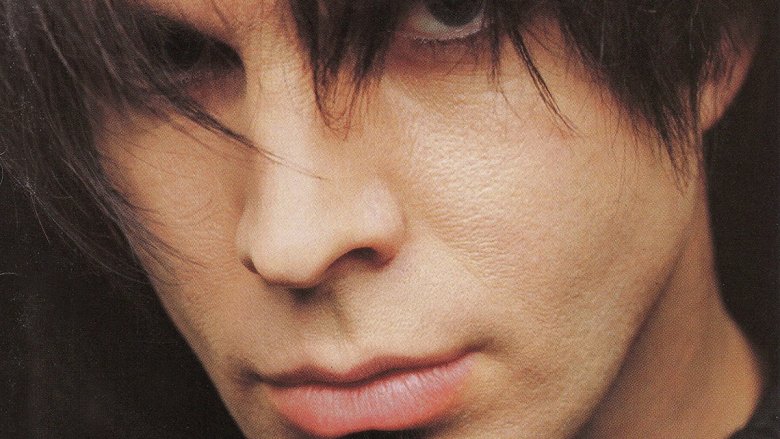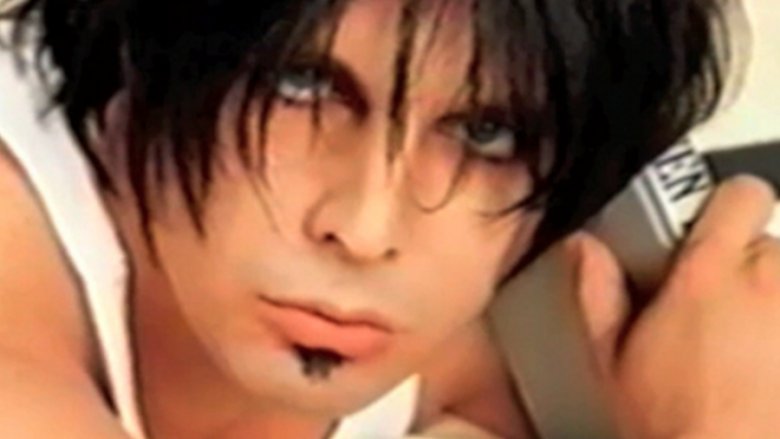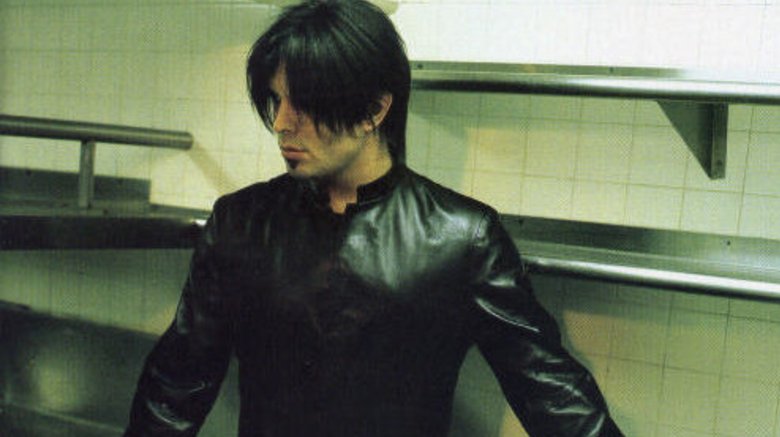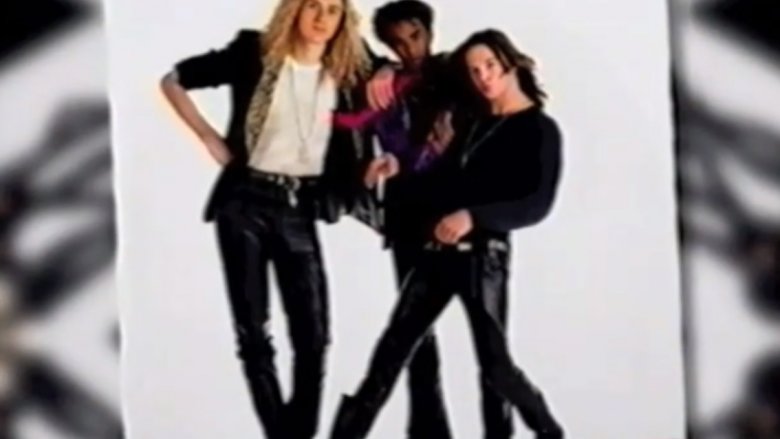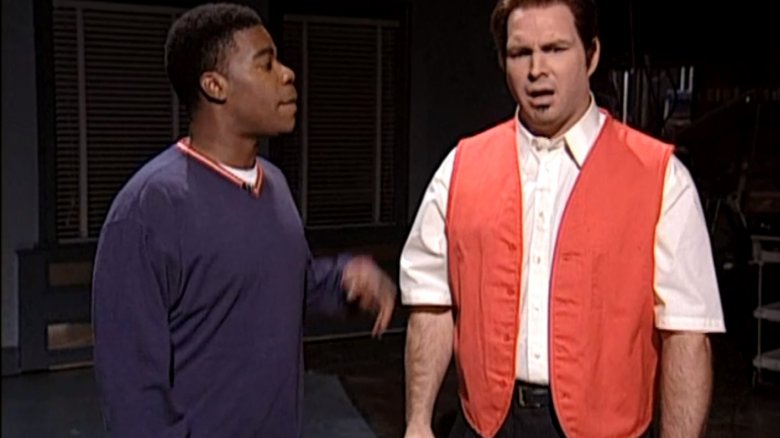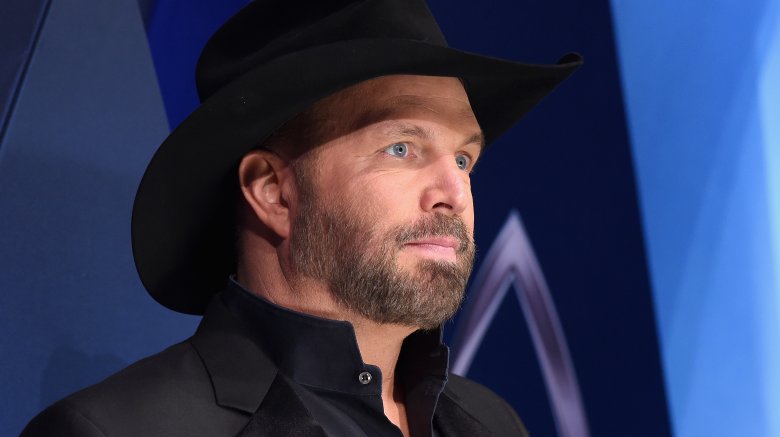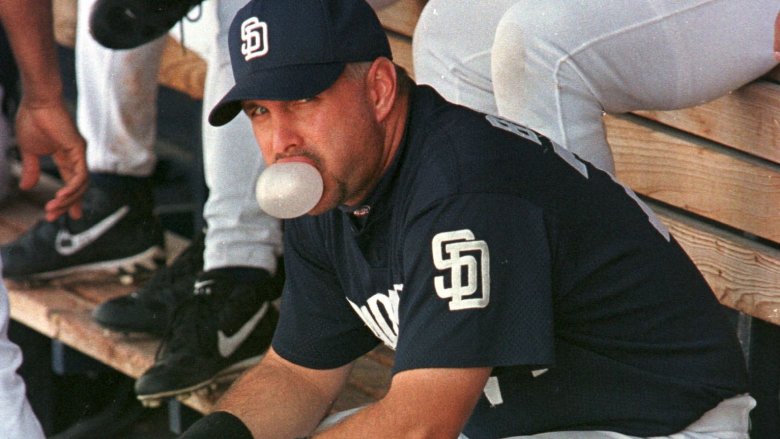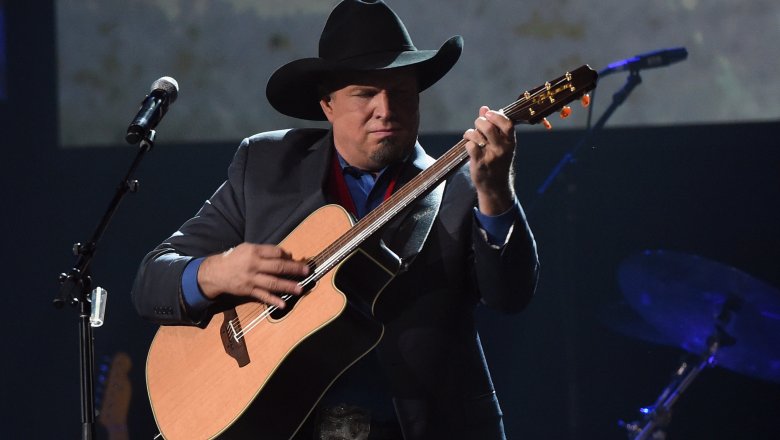The Untold Truth Of Chris Gaines
In 1999, Garth Brooks was on top of the country music world. He decided to tackle rock next—but rather than just release a Garth Brooks rock album, he created an elaborate character named Chris Gaines. Sporting a soul patch and a long black wig, "Chris Gaines" was envisioned as the Ziggy Stardust to Brooks' David Bowie. In reality, he became the biggest embarrassment of Brooks' career. Here's a look at one of the weirdest episodes in music history.
Gaines' only album was a greatest hits compilation
Garth Brooks didn't simply put out Chris Gaines' purported debut album—he released a Gaines greatest hits compilation. If it wasn't already confusing enough for fans wondering why Brooks was dressed like a goth teenager, he made it worse by pretending that people were supposed to have already heard of his alter ego.
Creatively titled Chris Gaines' Greatest Hits, the album was supposedly the highlights of highly successful solo albums like Gaines' "debut," Straight Jacket, whose cover featured Gaines pictured in a straightjacket—flanked by naughty nurses, as is a rock star's wont. Greatest Hits was meant to be a re-introduction to Gaines in advance of his next new solo album, The Lamb. You never heard The Lamb. Nobody did, because Greatest Hits wound up taking the greatest nosedive of Brooks' career.
In a vacuum, the album actually did very well, selling over two million copies worldwide. (If this happened today, Gaines would be a god among unit shifters.) But compared to Brooks' previous efforts, two million was nothing; by that standard, Gaines' Greatest Hits was a major flop. Brooks has wisely kept the soul patch shaved ever since.
Brooks had a Gaines empire in mind
Brooks wasn't content to simply release a rock album as somebody else. No, he wanted to make lots of rock albums—and a movie—as somebody else. Needless to say, none of those plans panned out.
The movie was to be called The Lamb and, oddly enough, the Gaines character was to die in the opening scene. Rather than be the shortest movie ever, the rest of The Lamb would focus on a Gaines super-fan out to prove their idol was murdered. Brooks, as Gaines, would appear in flashbacks—a "rock 'n' roll Citizen Kane," as summed up by Stereogum. But Brooks had other plans for his rockin' imaginary friend, too. According to CNN, he wanted to follow up The Lamb with a soundtrack album (Greatest Hits was the "pre-soundtrack," despite that term making no sense at all), and was also contemplating recording Gaines' supposed early discography, all previously released exclusively for the voices in Garth Brooks' brain.
Fortunately, after the failure of Greatest Hits, Brooks got the hint and stopped the Chris Gaines story dead in its tracks. The Lamb never became a movie, Gaines released no more albums, and Garth Brooks went back to being Garth Brooks, making the music world much happier. Truly, his loss was the world's...gaines.
Gaines' backstory was ridiculous
Releasing an album as a made-up character, while planning a movie as that same character, is weird enough on its own. But Brooks wasn't done, concocting perhaps the most bizarre backstory of any rock star alter ego to date, including Ziggy Stardust—and that dude was an actual alien.
The story of Chris Gaines, as explained by Wide Open Country, is basically the ultimate ridiculous rock star biography. Apparently, Gaines was a young rebel whose dad never approved of his rockin' ways. But Gaines made his music anyway, forming his first band in high school, a group called Crush. They started to get famous, then Crush's singer died in a plane crash. Gaines rebounded with a solo debut that sold an impressive 12 million copies. But then his dad died, which spiraled him into a vicious cycle of sex addiction.
After several more successful albums, he learned he was being ripped off by his record contract, and after wiggling his way out of it, he got into a terrible car accident that required extensive facial surgery that magically made him look like Garth Brooks—convenient, since Brooks was set to play Post-crash Gaines in the Lamb movie.
Gaines had an insane VH1 Behind the Music
In the late '90s, if you were a rock star and had a tale to tell, you told it on VH1's Behind the Music. Apparently, this applied even if you weren't technically a real person, because Chris Gaines got his very own episode. It's everything the Mötley Crüe Behind the Music gave us, and so much more.
Called Behind the Life of Chris Gaines, this special somehow made Gaines even more absurd. Within two minutes, we learn about the time he brought a chainsaw on tour. Billy Joel shows up for no reason other than to show he's Gaines' friend. They filmed a cheesy music video for Crush's "My Love Tells Me So." We also learn that, according to his awful record contract, he his manager owned everything he bought. He actually wasn't even signed to his label—his manager was. (Even the shadiest of real-life contracts don't work this way, but Gaines' world is clearly not our own.)
Perhaps silliest of all, however, is the special's constant reminders of Gaines' sex addiction. As his recording engineer put it, Chris "had babes at home, on the road, on the bus, on tour, off tour, in the studio, out of the studio, in a session, out of a session, at clubs and bars." Ex-girlfriends and groupies aplenty offer up extra reassurance Chris Gaines can't stop, as he calls it, "communicating." The special notes his "vice" almost killed him, though they never really explain how.
Truth be told, we don't need The Lamb. VH1 gave fans all the Chris Gaines goodness they could possibly handle.
Brooks filmed an NBC special as Brooks, playing Gaines songs
Here's where it somehow gets more confusing. Not only was Garth Brooks pretending to be Chris Gaines for an album, he was also openly playing Gaines in the movie. Meanwhile, in the 1999 NBC special Garth Brooks... In the Life of Chris Gaines, he stopped pretending Gaines was real, which completely blurred the lines on what exactly fans were supposed to think of the whole thing.
The special stars Garth Brooks as Garth Brooks, talking about what it was like to play Gaines. He talks about how tough it was trying to look like a skinny rock star when he, well, wasn't one, and also remarks how strange it was for Gaines' falsetto to come from his face. Every few minutes, however, the screen throws us "Did You Know?" facts about Chris Gaines, even though the special is making it crystal clear he isn't real.
Interspersed between Brooks talking about his, as he puts it, "fictitious character that just lets it swing," we see clips of Brooks playing his character's songs for a live crowd while acting like Gaines isn't actually a character. In the big reveal at the end, he mentions the major car wreck Gaines was in that forced his facial reconstruction, and then reveals Gaines' face to the crowd. Tongue firmly in cheek, he quips that Gaines looks "a little like Prince" and adds, "I think that's a damn good-looking man right there." Brooks was clearly having a bit of goofy fun here, though the tepid reaction to the music suggested few fans shared his enthusiasm.
Brooks hosted SNL and was the musical guest (as Gaines)
Like any rock star worth his guitar strings, Chris Gaines appeared on an episode of Saturday Night Live as the musical guest. You get one guess as to who the host was.
Yes, Garth Brooks hosted the November 1999 episode, throwing on the Gaines wig and performing in character come musical break time. For the most part, he kept himself and his alter ego separate, despite both men sporting the same soul patch all of a sudden. The exception was one memorable sketch, in which SNL star Tracy Morgan corners Brooks to rant about how much he hates Gaines. Morgan tells Brooks he thinks Gaines acts like a diva, calling him a "weady-beady bing-bong freak," whatever that means. He then calls Gaines fat, which visibly horrifies Brooks. SNL producer Lorne Michaels then tells Brooks he's needed onstage—and after he leaves, Morgan admits to Michaels he knows full well Brooks and Gaines are the same person. It's the comedy equivalent of a pro wrestler admitting wrestling's made up.
Interestingly, this appearance came roughly two months after Greatest Hits hit shelves, which was presumably enough time for everyone—including Brooks—to know the experiment wasn't going well, so he might as well joke about it. Morgan even asked Michaels, "Did you hear the album?" Michaels replied that he hadn't, and the two agreed Garth was "a strange guy." Millions of country, rock, and music fans almost certainly agreed.
Gaines brought Brooks his only Top 40 pop hit
In the context of Brooks' otherwise incredible career, Chris Gaines was a failed venture. Few of his fans bought the album, and even fewer clamored for the movie. However, Brooks did achieve a career milestone as Gaines, successfully crossing over onto the pop charts for the first time.
While Brooks has many country hits—19 Number One songs and 36 in the Top 10, according to Billboard—he never had a genuine pop hit. The closest he came was 1998's "It's Your Song," which made it to No. 62 on the Billboard Hot 100. Then came Chris Gaines who, despite his album going nowhere, shot Brooks almost straight to the top of the charts. His single "Lost In You" peaked at No. 5 on the Hot 100 in September 1999, no small feat for a song by a country singer cosplaying as a figment of his imagination.
Since then, Brooks has had several songs enter the Hot 100, but none have even flirted with Top 10 territory. Reaching No. 46, 2001's "Wrapped Up in You" came closest, but for the most part, if Brooks wants to become a pop star again, he'd better hope his Gaines wig still fits.
Brooks attempted pro baseball the same year he played Gaines
Posing as Chris Gaines wasn't the only weird thing Garth Brooks did in 1999. Months before unveiling his inner rocker, Brooks also amazingly attempted to become a major league baseball player.
According to Baseball Reference, Brooks was a high school baseball player, which—along with his incredible fame—was enough to get him drafted by the San Diego Padres as a left fielder. While it was mostly a stunt for a good cause—in lieu of a salary, the Padres donated $200,000 to a Brooks charity—the fact remains that Garth Brooks legitimately went on the field as a legitimate member of the Padres minor league system. He also legitimately stunk, going 1-for-22 and being used mostly as a pinch hitter and runner. Needless to say, he was never called up to the majors.
He probably didn't ever really think he'd make the team, but this is the same guy who tried using a wig and some eyeliner to make himself a rock star. Who knows what he was really thinking?
Brooks doesn't regret the Gaines experiment
Ever after taking a hit to his reputation with the Chris Gaines debacle, Brooks doesn't seem bitter or resentful at all. In fact, if Gaines were real, Brooks would almost certainly walk up to him, shake his hand, and say, "no hard feelings."
During a 2015 press conference, Brooks told reporters that despite "getting the s*** kicked out of him" by the negative Gaines reception, he has no regrets about attempting to bring the rocker to life. "I love the music," he insisted, "and that's what it's all about." As for more Gaines music, he doesn't seem opposed to the idea, though he did joke, "Would I ever drop that much weight again? I don't think I could."
That said, Brooks has reached a point in his career where he doesn't need a wig or a new name to rock. According to Rolling Stone, his 2014 comeback album, Man Against Machine, was "one of the year's best accidental rock albums," a record studded with "ripping guitar solos, Aerosmith-style strings and gospel-tinged background vocals." It's enough to make a person wonder what might've happened had Brooks made this type of music during his '90s commercial peak—only as himself. Gaines' soul patch was more unnecessary than anyone at the time even realized.
